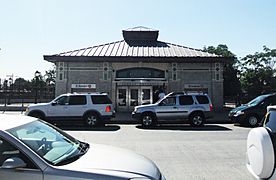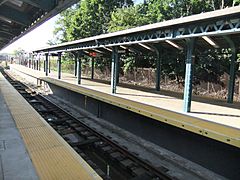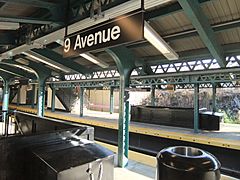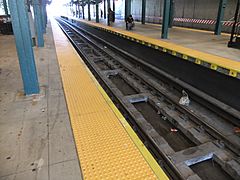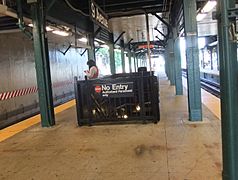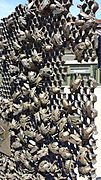Ninth Avenue station facts for kids
Quick facts for kids
9 Avenue
|
|||||||
|---|---|---|---|---|---|---|---|
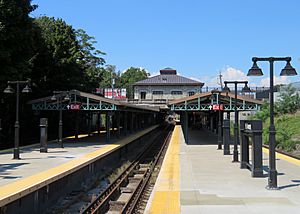
Ninth Avenue station in September 2018
|
|||||||
| Station statistics | |||||||
| Address | Ninth Avenue & 39th Street Brooklyn, NY 11232 |
||||||
| Borough | Brooklyn | ||||||
| Locale | Sunset Park | ||||||
| Coordinates | 40°38′48″N 73°59′41″W / 40.646575°N 73.994674°W | ||||||
| Division | B (BMT) | ||||||
| Line | BMT West End Line BMT Culver Line (formerly) |
||||||
| Services | D alltimes (all times) | ||||||
| Transit connections | |||||||
| Structure | Open-cut | ||||||
| Levels | 2 (upper level is in revenue service) | ||||||
| Platforms | 4 island platforms (2 on each level) cross-platform interchange |
||||||
| Tracks | 6 (3 on each level) | ||||||
| Other information | |||||||
| Opened | June 24, 1916 | ||||||
| Closed | BMT Culver Line platforms: May 11, 1975 | ||||||
| Station code | 059 | ||||||
| Opposite-direction transfer available | Yes | ||||||
| Traffic | |||||||
| Passengers (2019) | 1,708,387 |
||||||
| Rank | 274 out of 425 | ||||||
| Station succession | |||||||
| Next north | 36th Street: D alltimes 36th Street (Culver Line; demolished) |
||||||
| Next south | Fort Hamilton Parkway (Culver Line; demolished) Fort Hamilton Parkway (local): D alltimes 62nd Street (express): no regular service |
||||||
|
|||||||
|
|||||||
|
|||||||
|
|
|||||||
|
9th Avenue Station (Dual System BRT)
|
|||||||
| MPS | New York City Subway System MPS | ||||||
| NRHP reference No. | 05000676 | ||||||
| Added to NRHP | March 3, 2005 | ||||||
The Ninth Avenue subway station is a two-level train stop in Brooklyn, New York City. It's part of the New York City Subway system and is located where Ninth Avenue meets 39th Street. This station is special because it has two levels, each with three tracks and two island platforms (platforms with tracks on both sides).
The upper level is currently used by the BMT West End Line. The lower level used to be for the BMT Culver Line. Today, only the upper level is open for trains. The D train stops here all the time.
Station History
The Ninth Avenue station first opened on June 24, 1916. It was part of the first section of the BMT West End Line. This line originally started as a surface railway in 1862. It was called the Brooklyn, Bath and Coney Island Railroad.
Later, as part of the "Dual Contracts" of 1913, an elevated train line was built. This new line went over New Utrecht Avenue, 86th Street, and Stillwell Avenue.
Station Upgrades
In the 1950s, the platforms at the station were made longer. This was done so they could fit the longer trains used today. These trains are about 615 feet (187 meters) long.
The station also got a makeover in 2012. Workers added new platform edges and a new room for the train dispatcher. A new staircase was also built, leading to the nearby 36th Street Yard.
Station Design
Both the upper and lower parts of the station have three tracks. They also each have two island platforms.
Upper Level Details
The upper level is the only part of the station that is still used. It has a center express track, but this track is not usually used. So, only the tracks on the sides, called local tracks, are in regular service.
The platform for trains going to Manhattan is a bit wider than the platform for trains going to Coney Island. At the west end of the upper platforms, there's a bridge for subway employees. This bridge leads to the entrance of the 36th–38th Street Yard. There is also a control tower for the train line at the south end of the yard.
Lower Level Details
The lower level of the station used to be a route for the BMT Culver Line. Trains from this line could go to the BMT Fourth Avenue subway and the BMT Fifth Avenue elevated lines. This changed in 1954. After that, most Culver Line trains used a different route.
A special shuttle train service, called the Culver Shuttle, started from this station. It went to a new single-track stop at Ditmas Avenue. Some Culver trains still went to Manhattan until May 1959. The Culver Shuttle service stopped completely on May 11, 1975. Since then, the lower level has been closed and is not used for passengers.
The lower level is dark, and the two staircases leading to it do not have safety barriers. One fluorescent light still works on the southbound side. The next stop for the old shuttle was Fort Hamilton Parkway. The tracks curve just east of the station. The center and southbound local tracks end at a wall, called a bumper block. The northbound local track continues past the tunnel opening. It runs next to another track from the 36th–38th Street Yard, but they don't connect. This was the track used by the shuttle from 1959 to 1975.
Filming Location
The abandoned lower level of the station has been used in movies! It appeared in the original Crocodile Dundee movie (1986). In the film, it pretended to be the 59th Street–Columbus Circle station. You can tell it's Ninth Avenue because of the "9" wall mosaics and the sunlight at the end of the movie.
The lower level also showed up in a key scene in the movie Joker (2019).
Station Exits
The main station building is at street level. It's near the corner of 9th Avenue and New Utrecht Avenue. There's also a closed entrance on the west side. Inside the station, the decorative grilles in the mezzanine (a floor between two main floors) are still there. A newsstand used to be across from where the station agent works now.
Track Layout
East of the station, the West End line goes from a raised area to an elevated structure. Here, you can see where the old BMT Culver right-of-way (the path where the tracks used to be) leaves the tunnel. Only one track comes out of the tunnel. It ends about 750 feet (229 meters) later, before Fort Hamilton Parkway, with no other connections. There is also a platform there. This platform was built in the late 1980s for New York City Transit employees only. It is not part of the public right-of-way.
To the west of the station, the tracks are very complex. There are connections from the Fourth Avenue Line and ramps from the old Fifth Avenue El (an elevated train line that was torn down). There are also ramps from the 36th–38th Street Yard. All these tracks come together to form the six tracks and two levels of the station.
Beyond these ramps, the line curves under the BMT Fourth Avenue Line. There are tracks that continue straight into the piers on the Sunset Park waterfront. These tracks were once used by the South Brooklyn Railway. In the tunnel leading to the 36th Street station, there's an unused trackway. This trackway was meant to connect to the South Brooklyn Railway, but the connection was never built. This unused trackway joins the southbound track and runs for a long distance before ending at a wall.
Gallery
- nycsubway.org – BMT West End Line: Ninth Avenue
- nycsubway.org – BMT Culver Line: Ninth Avenue
- Station Reporter — D Train
- The Subway Nut — Ninth Avenue Pictures
See also
 In Spanish: Novena Avenida (línea West End) para niños
In Spanish: Novena Avenida (línea West End) para niños
 | Anna J. Cooper |
 | Mary McLeod Bethune |
 | Lillie Mae Bradford |





